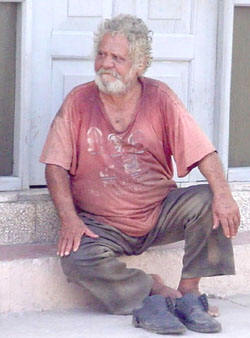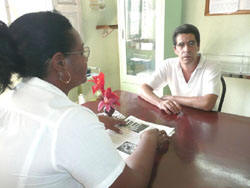
March 31, 2008
Roaming the Streets

March 31, 2008
Roaming the Streets
To find a solution to the problem of people roaming the streets without protection involves several organizations. Families must be involved.
FROILAN PARRA SUAREZ
HOLGUIN. — He was a skillful builder whose hands were capable of achieving amazing changes on the houses of his clients, even with few resources. Due to his skill, many people thank him for the houses they now live in.
 SOCIETY
AS A WHOLE CAN HELP PEOPLE IN A DIFFICULT SITUATION DUE TO ALCOHOLISM.
SOCIETY
AS A WHOLE CAN HELP PEOPLE IN A DIFFICULT SITUATION DUE TO ALCOHOLISM.
But his irremediable addiction to alcohol transformed him until his death. Filthy, dressed in rags, with a stick as a cane and barefooted, he wandered around the streets for years, and contemplated many dawns from the benches of Holguin parks.
Despite the fact that his closest family abandoned him after losing all hope for his recovery, his farewell, however, was surrounded by the love and care of doctors and nurses from the Geriatrics Ward of the city’s Vladimir Ilich Lenin Hospital.
ORDINARY PEOPLE UNTIL THEIR LIVES CHANGE
He’s not just one case. Unfortunately, others occur in many Cuban cities and they unfold before our eyes. They are not pariahs. They’re ordinary people, with steady trades and stable behavior, until one day their lives change due to alcohol or the strange veil of dementia clouds their minds.
 Dr. Lourdes Mora
with her patients, during a collective reading at the Center for Mental Health
and Psychosocial Rehabilitation.
Dr. Lourdes Mora
with her patients, during a collective reading at the Center for Mental Health
and Psychosocial Rehabilitation.
A group of researchers devotes its time to the analysis of different life situations, which can’t be seen separately in an issue as sensitive and complex as that of people roaming around the streets.
The phenomenon has multiple causes, so they are preparing a profile of those wandering about the streets of Holguín. Most of them are men and women between 50 and 60 years of age, who have been abandoned by their families. There are neighborhoods that have greater proclivity for this problem, like the Alcides Pino. These cases are generally linked to poverty.
According to Dr. Lilia Blanco, head of the Provincial Psychiatry Group, most of these people are being taken care of at health institutions and receive the treatment required in each case according to their medical condition.
 JOSE LUIS
CERVANTES ALLEN, AN ELECTRICAL ENGINEER, SUFFERS FROM PARANOID SCHIZOPHRENIA
ASSOCIATED WITH ALCOHOL. HE WAS RESCUED FROM THE STREETS, THANKS TO A COLLECTIVE
EFFORT.
JOSE LUIS
CERVANTES ALLEN, AN ELECTRICAL ENGINEER, SUFFERS FROM PARANOID SCHIZOPHRENIA
ASSOCIATED WITH ALCOHOL. HE WAS RESCUED FROM THE STREETS, THANKS TO A COLLECTIVE
EFFORT.
They need the care of their family, if they have one, and that of the staff created to take care of this type of behavior, characterized by a loss of hygiene, wandering around aimlessly, and low self-esteem. They display multiple and complex problems, and the solutions are also so for every case, she Dr. Blanco.
However, in all cases, the loss of personal and social responsibility is identified as the reason for their behavioral changes.
A character sketch of each patient is made to identify their habits, families, and the possibilities of the latter of taking care of them until they reach a diagnosis.
PLACEMENT AND REINTEGRATION INTO SOCIETY
Some are placed in specialized centers, others at senior citizen’s homes while others are returned to their families, who have the social duty of assuming their care.
Up to February, the Center for Mental Health and Psychosocial Rehabilitation has received 321 patients; 18 of them were sent to their provinces, 37 to their municipalities of origin, and 68 are now being taken care of at municipal Community Centers. Most are alcoholics or suffer from behavioral disorder aggravated by alcohol consumption, explains Dr. Edgar Serrano.
Several patients have been relocated thanks to the collective effort of the offices participating in the analysis of each case at the Commission for Assistance and Social Attention, even some from provinces like Havana, Santiago de Cuba and Villa Clara.
The work of the specialized brigades of social workers is decisive to complete their social rehabilitation. Many cases are critical and require detailed analyses on the local level.
Like the English poet John Donne once said: “No man is an island, entire of itself; every man is a piece of the continent, a part of the main..” Therefore, to create and strengthen integral values it’s essential to put the necessary emphasis on the role of families, so those engulfed in alcoholism can overcome the difficulties imposed by daily life, and society as a whole can help them achieve the wellbeing and respect they need as human beings.

Deambulantes
http://www.granma.cubaweb.cu/2008/03/30/nacional/artic01.html
Buscar solución al problema de las personas que deambulan sin protección por las calles involucra a varias organizaciones. La familia no puede estar ajena
FROILAN PARRA SUAREZ
HOLGUIN.— Fue un hábil albañil cuyas prodigiosas manos eran capaces de lograr cambios impresionantes en las viviendas de sus clientes, aunque tuvieran pocos recursos. A su habilidad muchas personas agradecen las casas donde viven.
 Foto: La sociedad
en su conjunto puede ayudar a las personas que se encuentran en situación
difícil, como consecuencia del consumo de alcohol.
Foto: La sociedad
en su conjunto puede ayudar a las personas que se encuentran en situación
difícil, como consecuencia del consumo de alcohol.
Pero su incorregible adicción al alcohol lo transformó hasta su muerte. Tiznado, con la ropa sucia y harapienta, un palo como bastón y descalzo, deambuló durante años por las calles y contempló muchos amaneceres en los bancos de los parques holguineros.
Pese a que la familia más cercana lo abandonó, luego de perder la esperanza en su recuperación, su despedida de este mundo, sin embargo, estuvo rodeada del cuidado de médicos y enfermeras de la Sala de Geriatría del Hospital Vladimir Ilich Lenin, de esta ciudad.
PERSONAS COMUNES HASTA UN DÍA
No es un solo caso; desafortunadamente, en muchas ciudades cubanas están al alcance de nuestros ojos. Tampoco son parias ni desclasados. Son personas comunes, con oficios y procederes estables, hasta un día en que cambian sus vidas por el alcohol o porque el velo extraño de la demencia nubla sus mentes.
 La doctora Lourdes
Mora Torres durante una lectura comentada con sus pacientes, en el Centro de
Salud Mental y Rehabilitación Psicosocial.
La doctora Lourdes
Mora Torres durante una lectura comentada con sus pacientes, en el Centro de
Salud Mental y Rehabilitación Psicosocial.
Un colectivo de investigadores se dedica al análisis de las variadas situaciones de la vida social, que no pueden verse por separado en un tema sensible y con tantas aristas como el de los deambulantes.
Este fenómeno es multicausal, por lo que elaboraron un perfil de quienes deambulan por la ciudad de Holguín. Se trata, en su mayoría, de hombres entre 50 y 60 años, a los que la familia no atiende. Hay barrios más proclives a esta problemática, como el reparto Alcides Pino. Los casos están, generalmente, ligados a algún tipo de marginalidad.
Según la doctora Lilian Blanco, jefa del Grupo Provincial de Psiquiatría, la mayor parte de estas personas se encuentran atendidas en las instituciones de salud y reciben el tratamiento que cada caso requiere, según su situación médica.
 José Luis Cervantes Allen, ingeniero eléctrico, padece de esquizofrenia
paranoide asociada al alcohol, rescatado de las calles gracias a la labor
colectiva.
José Luis Cervantes Allen, ingeniero eléctrico, padece de esquizofrenia
paranoide asociada al alcohol, rescatado de las calles gracias a la labor
colectiva.
Necesitan el cuidado de la familia, si la tienen, y de quienes integran el sistema de atención para este tipo de conducta, caracterizada por la pérdida de los hábitos de higiene, el caminar sin rumbo fijo y la baja autoestima. Presentan problemas múltiples y complejos, por lo que las soluciones a cada caso también lo son, esclareció.
No obstante, en todos, la pérdida de la responsabilidad personal y social se identifica como la causa de la transformación en la conducta.
Para poder tratar a estas personas, se partió de una caracterización individualizada de cada paciente, con tal de identificar sus hábitos, su familia y las posibilidades de esta de hacerse cargo del paciente, hasta llegar a un diagnóstico.
UBICARLOS Y REINSERTARLOS
Algunos fueron ubicados en centros especializados, otros en hogares de ancianos o se entregaron a sus familias, que tienen el deber social de asumir el cuidado de estas personas.
En el Centro de Salud Mental y de Rehabilitación Psicosocial se ha atendido a 321 pacientes hasta el mes de febrero. De ellos, 18 fueron remitidos a sus provincias, 37 a los municipios de origen y 68 se atienden en los Centros Comunitarios de los municipios. La mayoría son alcohólicos o padecen trastornos de la conducta agravados por el consumo del alcohol, explica el doctor Edgar Serrano Hernández.
Gracias al trabajo conjunto de los organismos que participan en los análisis de cada caso en la Comisión de Prevención y Atención Social; ya han logrado reubicar varios casos, incluso algunos de provincias como La Habana, Santiago de Cuba y Villa Clara.
Para completar su reinserción social, resultan decisivas las brigadas especializadas de Trabajadores Sociales. Muchos casos son críticos y requieren de análisis pormenorizados en los Consejos Populares.
Como señalara el poeta inglés John Donne: "nadie es una isla, completo en sí mismo"; es, por tanto, imprescindible formar y fortalecer valores de manera integrada, con el necesario énfasis hacia el papel de la familia, para que estas personas puedan superar las dificultades que la vida les impone, y la sociedad en su conjunto pueda ayudarlas a alcanzar el bienestar y el respeto que requieren como seres humanos.